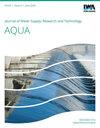人工智能和通信技术在水和能量平衡模型中的应用
IF 4.3
Q2 Environmental Science
引用次数: 0
摘要
水能平衡的精确校正是湍流能量平衡和农业用水流研究的一个重要难点。随着世界努力跟上不断增长的水和能源需求,对高效水和能源管理的需求正在增长。本研究从原始网络的所有节点考察人工智能(AI)对传感元件的水流和能量平衡合流子网络的影响。该研究提出了一种基于人工智能的优化传感器能量平衡模型(AI-SEBM),该模型利用压力数据来维持涡轮机中的能量平衡,并通过优化的能源来节约用水,以供农业使用。这项研究探索了安装Kalpan水轮机的潜力,它在半负荷运行时最有效,并且用很少的计算努力来预测所有负荷,以平衡湍流中的能量。为了预测网络中所有节点的每日压力读数和能耗,设计了一个基于人工智能的优化无线传感器网络,用于通信并连接到能量平衡系统。传感器战略性地部署在网络的神经中枢。最大流量算法用于表示水和能量平衡的网格,以确定虚拟节点的位置。本文章由计算机程序翻译,如有差异,请以英文原文为准。
Application of artificial intelligence and communication technology to water and energy balance models
The precise correction of water and energy balance is a significant difficulty in studying turbulence energy balance and water flow for agricultural purposes. The need for efficient water and energy management is growing as the world struggles to keep up with rising water and energy demands. This research examines artificial intelligence (AI)'s impact on the water flow and energy balance confluence subnetwork of sensing elements from all the original network's nodes. The study proposed an AI-based optimized sensor energy balance model (AI-SEBM) that uses pressure data to maintain energy balance in turbines and save water with the optimized energy source for agriculture usage. This research explores the potential for installing Kalpan hydraulic turbines, which are most effective during half-load operation, and to forecast all loads with little computing effort to balance energy in turbulence. To anticipate daily pressure readings and energy consumption across all nodes in the network, an AI-based optimization wireless sensor network is designed for communication and linked to an energy balance system. Sensors are strategically deployed at the network's nerve centres. The maximum flow algorithm is used for a grid representing the water and energy balance to determine the positions of the virtual nodes.
求助全文
通过发布文献求助,成功后即可免费获取论文全文。
去求助
来源期刊
CiteScore
4.70
自引率
0.00%
发文量
74
审稿时长
4.5 months
期刊介绍:
Journal of Water Supply: Research and Technology - Aqua publishes peer-reviewed scientific & technical, review, and practical/ operational papers dealing with research and development in water supply technology and management, including economics, training and public relations on a national and international level.

 求助内容:
求助内容: 应助结果提醒方式:
应助结果提醒方式:


